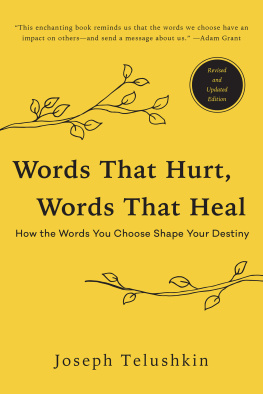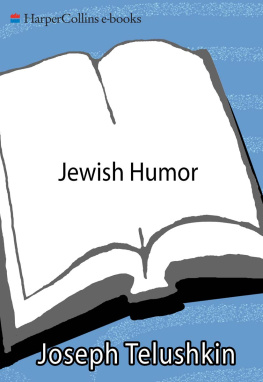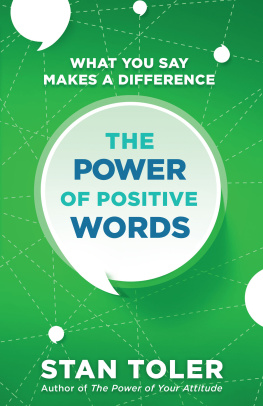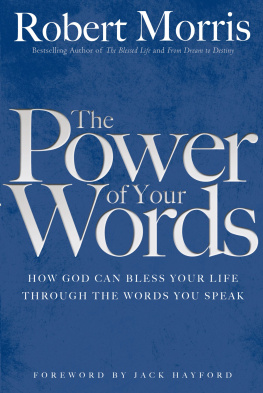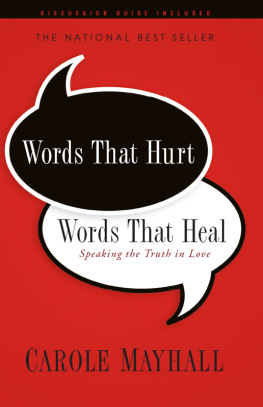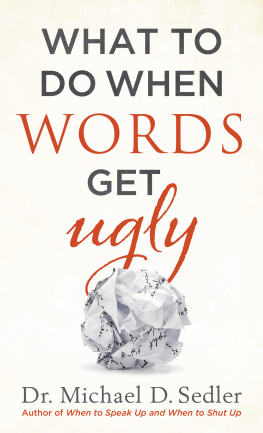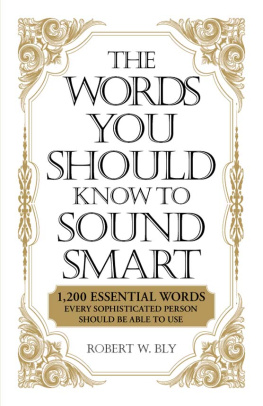Contents
For Shlomo Telushkin
of blessed memory, and
Bernard Bernie Resnick
of blessed memory
My father and my uncle:
two men of golden tongues and golden hearts,
whose words healed all who knew them
An old Jewish teaching compares the tongue to an arrow. Why not another weapon, a sword, for example? one rabbi asks. Because, he is told, if a man unsheathes his sword to kill his friend, and his friend pleads with him and begs for mercy, the man may be mollified and return the sword to its scabbard. But an arrow, once it is shot, cannot be returned.
Part One
The Power of Words to Hurt
In recent years, whenever I have lectured throughout the country on Words That Hurt, Words That Heal: How the Words You Choose Shape Your Destiny, Ive asked my listeners if they can go for twenty-four hours without saying any unkind words about, or to, anybody.
Invariably, a minority raise their hands signifying yes, some people laugh, and quite a large number call out, No!
All of you who cant answer yes, I respond, must recognize how serious a problem you have. Because if I asked you to go for twenty-four hours without drinking liquor, and you said, I cant do that, Id tell you, Then you must recognize that youre an alcoholic. And if I asked you to go for twenty-four hours without smoking a cigarette, or drinking coffee, and you said, Thats impossible, that would mean that youre addicted to nicotine or caffeine. Similarly, if you cant go for twenty-four hours without saying unkind words about or to others, then youve lost control over your tongue.
At this point, I almost always encounter the same objection: How can you compare the harm done by a bit of gossip or a few unpleasant words to the damage caused by alcohol and smoking or coffee?
Is my point overstated? Think about your own life: unless you, or someone dear to you, have been the victim of terrible physical violence, chances are that the worst pains you have suffered in life have come from words used cruellyfrom ego-destroying criticism, excessive anger, sarcasm, public and private humiliation, hurtful nicknames, betrayal of secrets, rumors, and malicious gossip.
Yet, wounded as many of us have been by unfairly spoken words, when youre with friends and the conversation turns to people not present, what aspects of their lives are you and your companions most likely to explore? Is it not their character flaws and the intimate details of their social livesprecisely those aspects of your own life that you would not like to hear others talking about?
If you dont participate in such talk, congratulations. But before you assert this as a definite fact, monitor yourself over the next twenty-four hours. Note on a piece of paper every time you say something negative about someone who is not present (without noting what was saidthat would be too time-consuming). Also record when others do so too, as well as your reactions to their words when that happens. Do you try to silence the speaker, or do you ask for more details?
To ensure the tests accuracy, make no effort to change the contents of your conversations throughout the next day, and dont try to be kinder than usual in assessing others character and actions. (Note your kind comments as well, but dont go out of your way to increase them during this test period.)
Most of us who take this test are unpleasantly surprised.
Our negative comments about those who are absent is but one way we wound with words; we also often cruelly hurt those to whom we are speaking. For example, many of us, when enraged, grossly exaggerate the wrong done by the person who has provoked our ire. The anger we express that is disproportionate to the provocation (as often occurs when parents rage at children) is unfair, often inflicts great hurt and damage, and thus is unethical. How many of you have endured excessive outbursts of rage from another person? Similarly, many of us criticize others with harsh and offensive words or are unable to have a disagreement without provoking a quarrel. Some of us are prone to belittling or humiliating other people, even in public. Because the damage inflicted by public humiliation can be devastating (as noted later, it has even led to suicides), Jewish law questions whether anyone guilty of this offense can ever fully repent. Hurtful speech can, of course, be far less extreme. Have you ever muttered a sarcastic comment that made the person to whom you were speaking feel demeaned or foolish?
Many otherwise good people often use words irresponsibly and cruelly in part because they regard the injuries inflicted by words as intangible, and therefore they minimize the damage words can inflict. Thus, for generations, children taunted by playmates have been taught to respond, Sticks and stones may break my bones, but words [or names] will never hurt me. In our hearts, we all know that this saying is untrue. Even the child who chants sticks and stones knows that words and names do hurt him or her. The statement usually is an attempt at bravado by a child who more likely feels like crying.
The National Committee for the Prevention of Child Abuse has compiled a list of disparaging comments made by angry parents to children, including:
- Youre pathetic. You cant do anything right.
- You disgust me. Just shut up!
- Hey, stupid. Dont you know how to listen?
- Youre more trouble than youre worth.
- Get outta here. Im sick of looking at your face.
- I wish you were never born.
Does anybody really believe that a child raised with such abuse truly thinks that sticks and stones can break my bones, but words will never hurt me?
The old Jewish teaching related in the epigraph to this book compares the tongue to an arrow. Why not another weapon, a sword, for example? one rabbi asks. Because, he is told, if a man unsheathes his sword to kill his friend, and his friend pleads with him and begs for mercy, the man may be mollified and return the sword to its scabbard. But an arrow, once it is shot, cannot be returned.
The rabbis comparison is more than a metaphor. Words can be used to inflict devastating, sometimes irrevocable, suffering. A penitent thief can return the money he has stolen, but one who damages anothers reputation through malicious gossip (what is often labeled character assassination) or who humiliates another publicly can never fully undo the damage.
As powerful as the capacity of words to hurt is their ability to heal. The anonymous author of a medieval Jewish text, The Ways of the Righteous (Orchot Tzaddikim), spends pages warning of the great evils routinely committed in speech. With the tongue one can commit numerous great and mighty transgressions such as... talebearing, mockery, flattery and telling lies. But with words rightly used, he reminds his readers, one can also perform limitless acts of virtue.
I remember reading a letter of gratitude sent by the nationally known preacher Reverend William Stidger (18851949) to an elementary school teacher who had given him great encouragement when he was her student decades earlier. A few days later, Stidger received a response, written in a shaky hand.
My dear Willie: I want you to know what your note meant to me. I am an old lady in my eighties, living alone in a small room, cooking my own meals, lonely, and seeming like the last leaf on a tree. You will be interested to know, Willie, that I taught school for fifty years and in all that time, yours is the first letter of appreciation I have ever received. It came on a cold blue morning and cheered my lonely old heart as nothing has cheered me in many years.
Later, I relate a story from perhaps the best-known lawyer today in the United States, Alan Dershowitz, whose lifeas an insecure teenagerwas permanently transformed by

